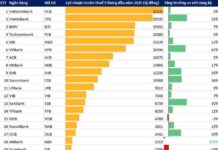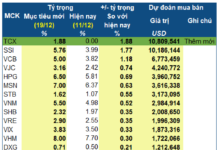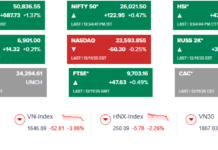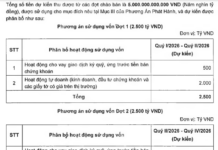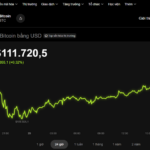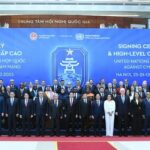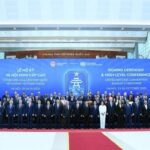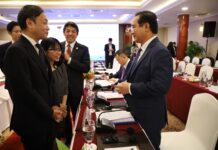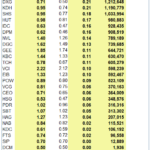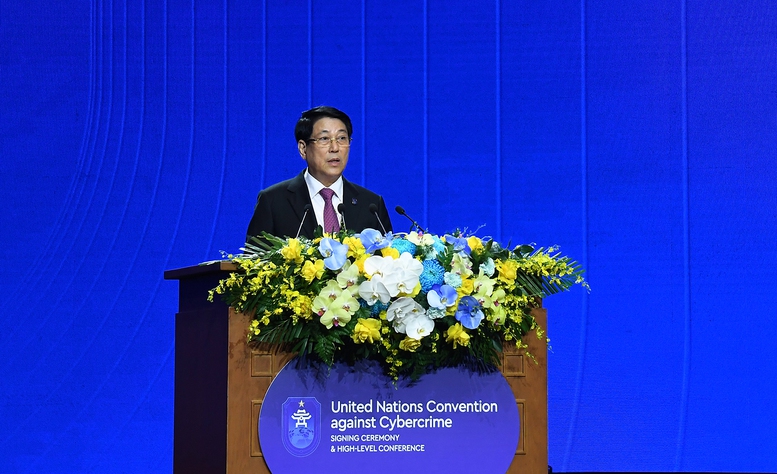
President Luong Cuong warmly welcomed delegates to Hanoi, the City for Peace, to attend the Signing Ceremony of the United Nations Convention on Cybercrime – Photo: VGP/Hai Minh
On the morning of October 25, the Signing Ceremony and High-Level Conference of the United Nations Convention on Cybercrime (Hanoi Convention) were solemnly held at the National Convention Center under the theme “Combating Cybercrime, Sharing Responsibility, Towards the Future.” President Luong Cuong chaired and delivered a speech at the opening session of the Signing Ceremony.
According to President Luong Cuong, with the theme “Combating Cybercrime, Sharing Responsibility, Towards the Future,” today’s Signing Ceremony embodies the spirit of international solidarity and the shared commitment of nations to build a safe, healthy, and sustainable cyberspace.
This event not only marks the birth of a global legal instrument but also affirms the enduring vitality of multilateralism, where nations transcend differences to jointly shoulder responsibilities for the common good of peace, security, stability, and development, President Luong Cuong emphasized.
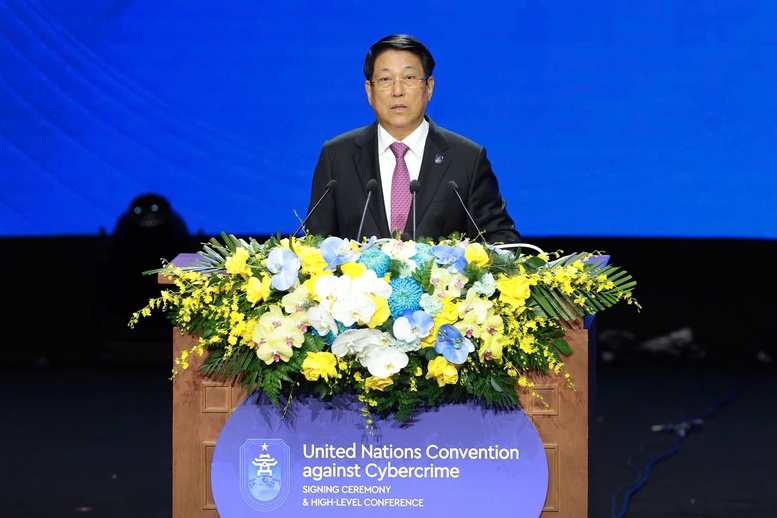
President Luong Cuong: The Hanoi Convention sends three clear messages, holding profound and lasting significance for the world – Photo: VGP/Nhat Bac
Cyberspace: A New Frontier for Development and Global Security
Throughout human history, science and technology have continuously expanded our spaces for survival, interaction, and development. Today, we are entering cyberspace, where every data stream, every technological action, and every digital interaction can profoundly impact national security, economies, development, and the future. Cyberspace is both a new frontier for development and a new battleground for global security, where opportunities and challenges intertwine, and technological progress must go hand in hand with ethics and responsibility.
Alongside the remarkable advancements in digital technology, cybercrime is rapidly increasing in scale, sophistication, and impact. Cybercrime has become a direct challenge to the security, development, and well-being of individuals in the digital age. Cyberattacks, data breaches, information manipulation, and critical infrastructure intrusions are becoming more organized and sophisticated, causing trillions of dollars in losses to the global economy annually. Personal data and safety are also under severe threat, with children and women being the most vulnerable.
Protecting national sovereignty, interests, and security, as well as safeguarding cyberspace, is not only a demand of the times but also a prerequisite for nations to develop swiftly and sustainably, contributing to global peace, stability, and prosperity.
The Hanoi Convention Delivers Three Clear Messages
President Luong Cuong stated that in the face of cybercrime challenges, the Hanoi Convention—a global multilateral treaty on combating cybercrime—stands as a vivid testament to the spirit of solidarity and the rule of law. Over five years of negotiations, with dozens of discussions and thousands of contributions, today’s achievement is the culmination of perseverance, wisdom, and trust among nations, as we choose dialogue over confrontation and cooperation over division.
This process embodies global values, reflecting consensus, the vitality of multilateralism, and the central role of the UN. The Hanoi Convention delivers three clear messages, holding profound and lasting significance for the world.
First, it affirms the commitment to shaping order and ensuring safety and security in cyberspace based on international law.
Second, it promotes the spirit of sharing, collaboration, and mutual support, as only through joint efforts and capacity-building can we safeguard a stable and sustainable cyberspace.
Third, it emphasizes that the ultimate goal of all efforts is to serve the people, ensuring technology enhances lives, fosters development, and provides opportunities for all, leaving no one behind in the global digital transformation.
These messages vividly reflect the core spirit of the Hanoi Convention—a treaty of the rule of law, cooperation, and the people. This is also the principle Vietnam steadfastly pursues in its international integration, grounded in law, driven by cooperation, and centered on the people as both the subject and goal of all efforts.
President Luong Cuong Urges Member States to Ratify the Convention
According to the President, for Vietnam, today’s Signing Ceremony of the UN Convention on Cybercrime is not only an honor but also a responsibility to the international community. With an independent, self-reliant, peaceful, cooperative, and developmental foreign policy, and as a proactive, active, reliable, and responsible member of the international community, Vietnam has consistently supported the negotiation process of this Convention over the past five years.
“We are proud that Hanoi—the capital of a nation rising from the ashes of war—was chosen as the starting point for creating a peaceful, cooperative, and trustworthy cyberspace,” the President expressed. “Vietnam’s hosting of the Signing Ceremony and being the first to sign the Hanoi Convention demonstrates our strong commitment to the rule of law, full compliance with international obligations, and contributions to strengthening the global legal order in cyberspace.”
For the Convention to truly take effect, we need not only political will but also resources for implementation. International cooperation in training, technical support, and technology transfer will enhance national capacities, contributing to a safe and stable cyberspace.
President Luong Cuong called on member states to promptly ratify the Convention, ensuring its swift entry into force and establishing a robust, inclusive, and rule-based digital order.
Today’s Crypto Market, October 25: Hanoi Convention Puts an End to Digital Asset Scams
The Hanoi Convention underscores Vietnam’s increasingly pivotal role in the global fight against cybercrime.
Money Laundering Through Illicit Bank Account and Business Transactions
High-tech criminals engaging in money laundering are becoming increasingly dangerous, sophisticated, and complex, making the need for robust anti-money laundering (AML) measures in the digital economy a critical challenge for nations worldwide, including Vietnam. As Vietnam’s economy becomes more open and interconnected, the urgency to enhance risk identification and mitigation in AML efforts has never been more pressing.
Hanoi Convention: Strengthening Financial Resilience Against Money Laundering Threats
In an era where sophisticated high-tech crimes are on the rise, anti-money laundering efforts have emerged as a critical pillar in safeguarding Vietnam’s financial system and bolstering trust in its digital economy.
Vietnam Landmark Officially Names Global Multilateral Treaty
Today, October 25th, marks a historic milestone as the Opening Ceremony for the Signing of the United Nations Convention on Combating Cybercrime takes place in Hanoi. Under the theme “Combating Cybercrime – Sharing Responsibility – Shaping the Future,” this event not only signifies a pivotal moment for the international community but also underscores Vietnam’s growing prominence on the global stage.









